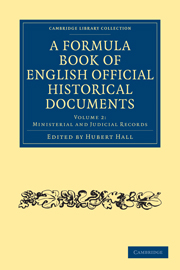C - POLITICAL OR STATUTORY INQUISITIONS
Published online by Cambridge University Press: 07 September 2010
Summary
Administrative or Remedial Insquisitions
56. The Inquest of Sheriffs (1170).—The interest of this measure for the present purpose lies, first, in the appearance at a very early date of certain Articles relating to ministerial misgovernment, which are reproduced in the Chapters of the Eyre and the Hundred Roll group of inquisitions, and, secondly, in the apparent survival of some fragments of the Inquisition itself. It will be observed that the first four Articles refer to separate Chapters of inquiry, a distinction which is emphasized in the last Article (13). Other Articles (6, 11, 12) relate exclusively to Crown business including the certification of homage (cf. Nos. 22 and 40) and even the state of the stock in the royal domains.
The original Returns above referred to, which contain the Inquisition taken in several Norfolk baronies ‘per terras baronum,’ appear to relate chiefly to the Inquisition under Article 2, though incidentally information is received regarding another Article (6) concerning the Marriage Aid of 1168. It is noticeable, however, that the Articles as preserved make no reference to Scutage which is the chief subject of these fragments.
This inquisition should be carefully compared with the ‘fiscal’ articles of the Assize of Northampton (1176).
57. The Hundred Rolls.—The origin and relationship of these familiar inquisitions have not perhaps been clearly understood by many students who have made use of the abundant constitutional and economic information supplied by the Exchequer and Chancery Records which are grouped under this title. Full particulars of the existing Inquisitions will be found in Mr Scargill-Bird's Guide.
- Type
- Chapter
- Information
- A Formula Book of English Official Historical Documents , pp. 126 - 191Publisher: Cambridge University PressPrint publication year: 2010First published in: 1909



